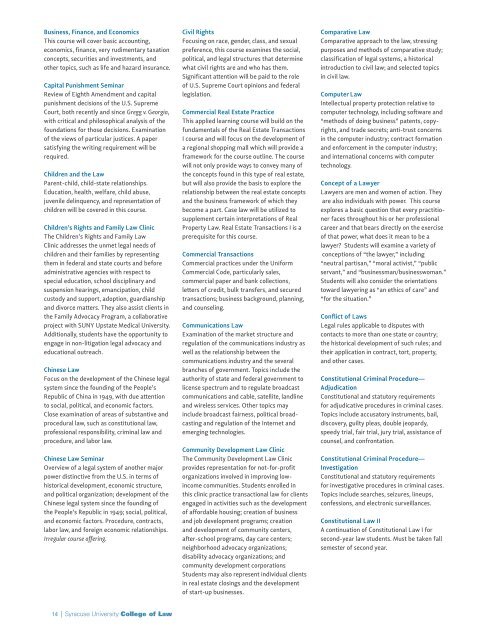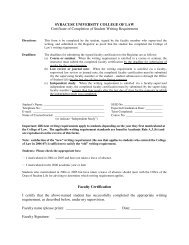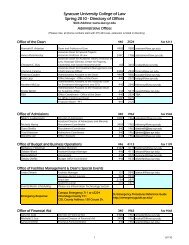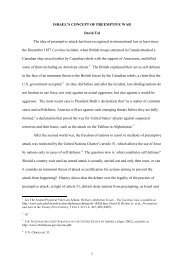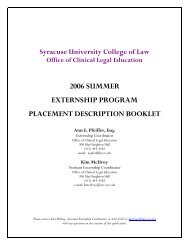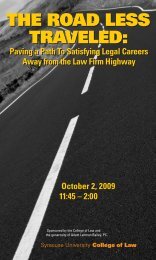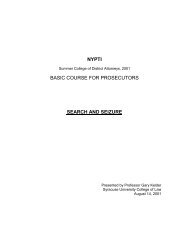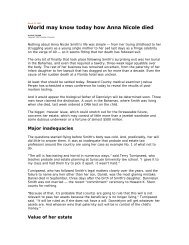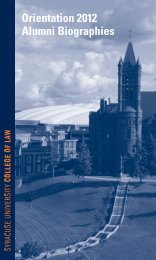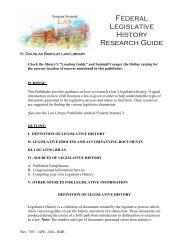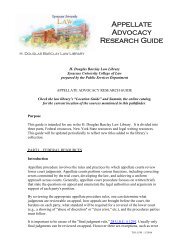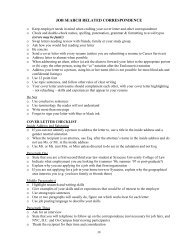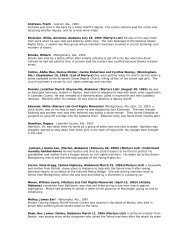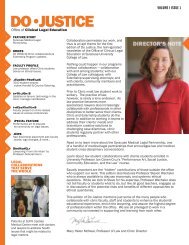CATALOG 2006-2007 - Syracuse University College of Law
CATALOG 2006-2007 - Syracuse University College of Law
CATALOG 2006-2007 - Syracuse University College of Law
You also want an ePaper? Increase the reach of your titles
YUMPU automatically turns print PDFs into web optimized ePapers that Google loves.
Business, Finance, and Economics<br />
This course will cover basic accounting,<br />
economics, finance, very rudimentary taxation<br />
concepts, securities and investments, and<br />
other topics, such as life and hazard insurance.<br />
Capital Punishment Seminar<br />
Review <strong>of</strong> Eighth Amendment and capital<br />
punishment decisions <strong>of</strong> the U.S. Supreme<br />
Court, both recently and since Gregg v. Georgia,<br />
with critical and philosophical analysis <strong>of</strong> the<br />
foundations for those decisions. Examination<br />
<strong>of</strong> the views <strong>of</strong> particular justices. A paper<br />
satisfying the writing requirement will be<br />
required.<br />
Children and the <strong>Law</strong><br />
Parent-child, child-state relationships.<br />
Education, health, welfare, child abuse,<br />
juvenile delinquency, and representation <strong>of</strong><br />
children will be covered in this course.<br />
Children’s Rights and Family <strong>Law</strong> Clinic<br />
The Children’s Rights and Family <strong>Law</strong><br />
Clinic addresses the unmet legal needs <strong>of</strong><br />
children and their families by representing<br />
them in federal and state courts and before<br />
administrative agencies with respect to<br />
special education, school disciplinary and<br />
suspension hearings, emancipation, child<br />
custody and support, adoption, guardianship<br />
and divorce matters. They also assist clients in<br />
the Family Advocacy Program, a collaborative<br />
project with SUNY Upstate Medical <strong>University</strong>.<br />
Additionally, students have the opportunity to<br />
engage in non-litigation legal advocacy and<br />
educational outreach.<br />
Chinese <strong>Law</strong><br />
Focus on the development <strong>of</strong> the Chinese legal<br />
system since the founding <strong>of</strong> the People’s<br />
Republic <strong>of</strong> China in 1949, with due attention<br />
to social, political, and economic factors.<br />
Close examination <strong>of</strong> areas <strong>of</strong> substantive and<br />
procedural law, such as constitutional law,<br />
pr<strong>of</strong>essional responsibility, criminal law and<br />
procedure, and labor law.<br />
Chinese <strong>Law</strong> Seminar<br />
Overview <strong>of</strong> a legal system <strong>of</strong> another major<br />
power distinctive from the U.S. in terms <strong>of</strong><br />
historical development, economic structure,<br />
and political organization; development <strong>of</strong> the<br />
Chinese legal system since the founding <strong>of</strong><br />
the People’s Republic in 1949; social, political,<br />
and economic factors. Procedure, contracts,<br />
labor law, and foreign economic relationships.<br />
Irregular course <strong>of</strong>fering.<br />
14 | <strong>Syracuse</strong> <strong>University</strong> <strong>College</strong> <strong>of</strong> <strong>Law</strong><br />
Civil Rights<br />
Focusing on race, gender, class, and sexual<br />
preference, this course examines the social,<br />
political, and legal structures that determine<br />
what civil rights are and who has them.<br />
Significant attention will be paid to the role<br />
<strong>of</strong> U.S. Supreme Court opinions and federal<br />
legislation.<br />
Commercial Real Estate Practice<br />
This applied learning course will build on the<br />
fundamentals <strong>of</strong> the Real Estate Transactions<br />
I course and will focus on the development <strong>of</strong><br />
a regional shopping mall which will provide a<br />
framework for the course outline. The course<br />
will not only provide ways to convey many <strong>of</strong><br />
the concepts found in this type <strong>of</strong> real estate,<br />
but will also provide the basis to explore the<br />
relationship between the real estate concepts<br />
and the business framework <strong>of</strong> which they<br />
become a part. Case law will be utilized to<br />
supplement certain interpretations <strong>of</strong> Real<br />
Property <strong>Law</strong>. Real Estate Transactions I is a<br />
prerequisite for this course.<br />
Commercial Transactions<br />
Commercial practices under the Uniform<br />
Commercial Code, particularly sales,<br />
commercial paper and bank collections,<br />
letters <strong>of</strong> credit, bulk transfers, and secured<br />
transactions; business background, planning,<br />
and counseling.<br />
Communications <strong>Law</strong><br />
Examination <strong>of</strong> the market structure and<br />
regulation <strong>of</strong> the communications industry as<br />
well as the relationship between the<br />
communications industry and the several<br />
branches <strong>of</strong> government. Topics include the<br />
authority <strong>of</strong> state and federal government to<br />
license spectrum and to regulate broadcast<br />
communications and cable, satellite, landline<br />
and wireless services. Other topics may<br />
include broadcast fairness, political broadcasting<br />
and regulation <strong>of</strong> the Internet and<br />
emerging technologies.<br />
Community Development <strong>Law</strong> Clinic<br />
The Community Development <strong>Law</strong> Clinic<br />
provides representation for not-for-pr<strong>of</strong>it<br />
organizations involved in improving lowincome<br />
communities. Students enrolled in<br />
this clinic practice transactional law for clients<br />
engaged in activities such as the development<br />
<strong>of</strong> affordable housing; creation <strong>of</strong> business<br />
and job development programs; creation<br />
and development <strong>of</strong> community centers,<br />
after-school programs, day care centers;<br />
neighborhood advocacy organizations;<br />
disability advocacy organizations; and<br />
community development corporations<br />
Students may also represent individual clients<br />
in real estate closings and the development<br />
<strong>of</strong> start-up businesses.<br />
Comparative <strong>Law</strong><br />
Comparative approach to the law, stressing<br />
purposes and methods <strong>of</strong> comparative study;<br />
classification <strong>of</strong> legal systems, a historical<br />
introduction to civil law; and selected topics<br />
in civil law.<br />
Computer <strong>Law</strong><br />
Intellectual property protection relative to<br />
computer technology, including s<strong>of</strong>tware and<br />
“methods <strong>of</strong> doing business” patents, copyrights,<br />
and trade secrets; anti-trust concerns<br />
in the computer industry; contract formation<br />
and enforcement in the computer industry;<br />
and international concerns with computer<br />
technology.<br />
Concept <strong>of</strong> a <strong>Law</strong>yer<br />
<strong>Law</strong>yers are men and women <strong>of</strong> action. They<br />
are also individuals with power. This course<br />
explores a basic question that every practitioner<br />
faces throughout his or her pr<strong>of</strong>essional<br />
career and that bears directly on the exercise<br />
<strong>of</strong> that power, what does it mean to be a<br />
lawyer? Students will examine a variety <strong>of</strong><br />
conceptions <strong>of</strong> “the lawyer,” including<br />
“neutral partisan,” “moral activist,” “public<br />
servant,” and “businessman/businesswoman.”<br />
Students will also consider the orientations<br />
toward lawyering as “an ethics <strong>of</strong> care” and<br />
“for the situation.”<br />
Conflict <strong>of</strong> <strong>Law</strong>s<br />
Legal rules applicable to disputes with<br />
contacts to more than one state or country;<br />
the historical development <strong>of</strong> such rules; and<br />
their application in contract, tort, property,<br />
and other cases.<br />
Constitutional Criminal Procedure—<br />
Adjudication<br />
Constitutional and statutory requirements<br />
for adjudicative procedures in criminal cases.<br />
Topics include accusatory instruments, bail,<br />
discovery, guilty pleas, double jeopardy,<br />
speedy trial, fair trial, jury trial, assistance <strong>of</strong><br />
counsel, and confrontation.<br />
Constitutional Criminal Procedure—<br />
Investigation<br />
Constitutional and statutory requirements<br />
for investigative procedures in criminal cases.<br />
Topics include searches, seizures, lineups,<br />
confessions, and electronic surveillances.<br />
Constitutional <strong>Law</strong> II<br />
A continuation <strong>of</strong> Constitutional <strong>Law</strong> I for<br />
second-year law students. Must be taken fall<br />
semester <strong>of</strong> second year.


